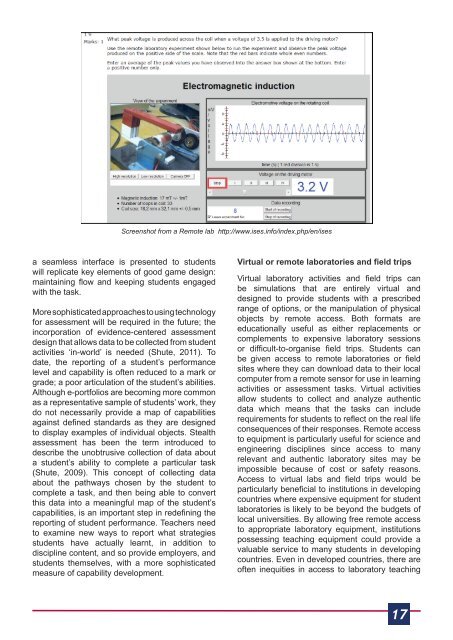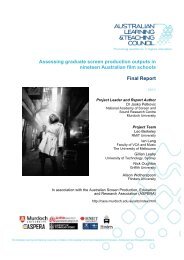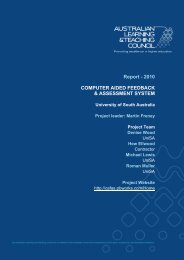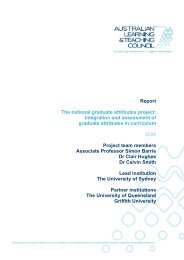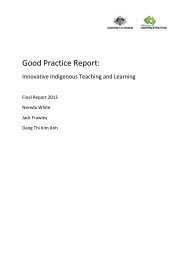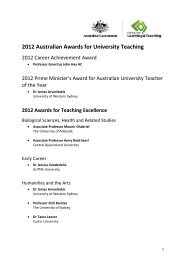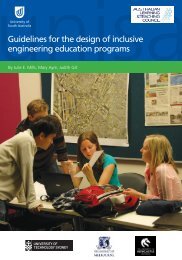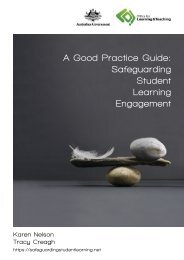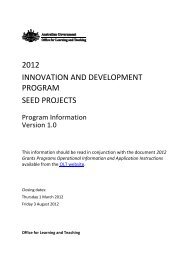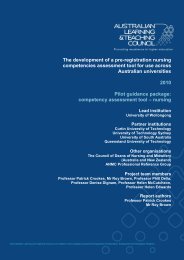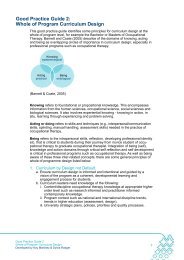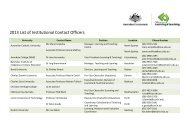Teacher's Handbook on e-Assessment - Office for Learning and ...
Teacher's Handbook on e-Assessment - Office for Learning and ...
Teacher's Handbook on e-Assessment - Office for Learning and ...
Create successful ePaper yourself
Turn your PDF publications into a flip-book with our unique Google optimized e-Paper software.
Screenshot from a Remote lab http://www.ises.info/index.php/en/ises<br />
a seamless interface is presented to students<br />
will replicate key elements of good game design:<br />
maintaining flow <strong>and</strong> keeping students engaged<br />
with the task.<br />
More sophisticated approaches to using technology<br />
<strong>for</strong> assessment will be required in the future; the<br />
incorporati<strong>on</strong> of evidence-centered assessment<br />
design that allows data to be collected from student<br />
activities ‘in-world’ is needed (Shute, 2011). To<br />
date, the reporting of a student’s per<strong>for</strong>mance<br />
level <strong>and</strong> capability is often reduced to a mark or<br />
grade; a poor articulati<strong>on</strong> of the student’s abilities.<br />
Although e-portfolios are becoming more comm<strong>on</strong><br />
as a representative sample of students’ work, they<br />
do not necessarily provide a map of capabilities<br />
against defined st<strong>and</strong>ards as they are designed<br />
to display examples of individual objects. Stealth<br />
assessment has been the term introduced to<br />
describe the unobtrusive collecti<strong>on</strong> of data about<br />
a student’s ability to complete a particular task<br />
(Shute, 2009). This c<strong>on</strong>cept of collecting data<br />
about the pathways chosen by the student to<br />
complete a task, <strong>and</strong> then being able to c<strong>on</strong>vert<br />
this data into a meaningful map of the student’s<br />
capabilities, is an important step in redefining the<br />
reporting of student per<strong>for</strong>mance. Teachers need<br />
to examine new ways to report what strategies<br />
students have actually learnt, in additi<strong>on</strong> to<br />
discipline c<strong>on</strong>tent, <strong>and</strong> so provide employers, <strong>and</strong><br />
students themselves, with a more sophisticated<br />
measure of capability development.<br />
Virtual or remote laboratories <strong>and</strong> field trips<br />
Virtual laboratory activities <strong>and</strong> field trips can<br />
be simulati<strong>on</strong>s that are entirely virtual <strong>and</strong><br />
designed to provide students with a prescribed<br />
range of opti<strong>on</strong>s, or the manipulati<strong>on</strong> of physical<br />
objects by remote access. Both <strong>for</strong>mats are<br />
educati<strong>on</strong>ally useful as either replacements or<br />
complements to expensive laboratory sessi<strong>on</strong>s<br />
or difficult-to-organise field trips. Students can<br />
be given access to remote laboratories or field<br />
sites where they can download data to their local<br />
computer from a remote sensor <strong>for</strong> use in learning<br />
activities or assessment tasks. Virtual activities<br />
allow students to collect <strong>and</strong> analyze authentic<br />
data which means that the tasks can include<br />
requirements <strong>for</strong> students to reflect <strong>on</strong> the real life<br />
c<strong>on</strong>sequences of their resp<strong>on</strong>ses. Remote access<br />
to equipment is particularly useful <strong>for</strong> science <strong>and</strong><br />
engineering disciplines since access to many<br />
relevant <strong>and</strong> authentic laboratory sites may be<br />
impossible because of cost or safety reas<strong>on</strong>s.<br />
Access to virtual labs <strong>and</strong> field trips would be<br />
particularly beneficial to instituti<strong>on</strong>s in developing<br />
countries where expensive equipment <strong>for</strong> student<br />
laboratories is likely to be bey<strong>on</strong>d the budgets of<br />
local universities. By allowing free remote access<br />
to appropriate laboratory equipment, instituti<strong>on</strong>s<br />
possessing teaching equipment could provide a<br />
valuable service to many students in developing<br />
countries. Even in developed countries, there are<br />
often inequities in access to laboratory teaching<br />
17


